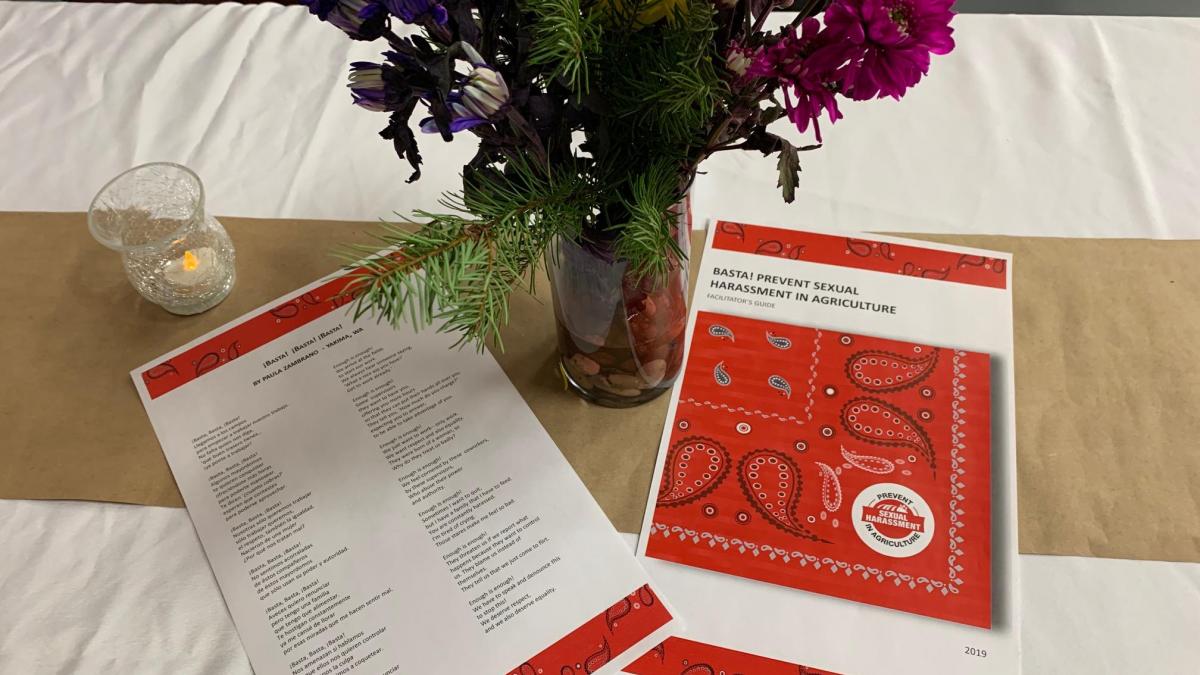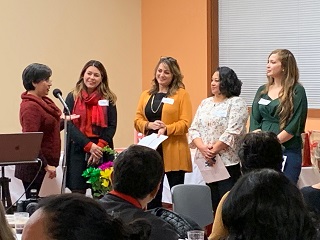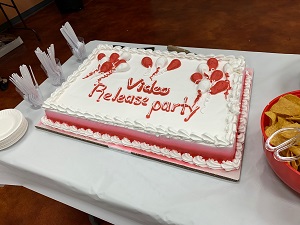
Female farmworkers experience workplace sexual harassment at rates that are two to three times higher than in other sectors, according to recent studies.
Since 2012, researchers in the Pacific Northwest Agricultural Safety and Health Center (PNASH) have worked alongside farmworkers and other members of Washington’s agricultural community to surface and study the stories of workers who have been sexually harassed. PNASH is part of the UW Department of Environmental & Occupational Health Sciences (DEOHS).
Now researchers have teamed up with farmworkers, growers and others to launch a new training curriculum called ¡Basta! Preventing Sexual Harassment in Agriculture, centered around a video released this week. Basta means “Enough” or “Stop” in Spanish.
“Until now, there has been a real lack of culturally appropriate tools tailored to address sexual harassment in agriculture,” said Jody Early, associate professor at UW Bothell and co-principal investigator of the PNASH project.
“We’re thrilled to release the first such Spanish-English curriculum developed in close collaboration with workers themselves.”
A hidden workplace safety issue
In Washington, an estimated 70 to 80 percent of female farmworkers are sexually harassed on the job, often by their supervisors.
“Workers often don’t report because of threats to themselves and their families’ health and safety,” said co-principal investigator Victoria Breckwich Vásquez of Sea Mar Community Health Centers and a DEOHS affiliate professor.
“Many women and men are particularly vulnerable in that they are economically disadvantaged, do not speak English or risk deportation.”
The issue came into focus for Breckwich Vásquez when she was approached by farmworkers receiving safety training for pesticide use and other agricultural tasks.
“They felt that this training was moot if they did not feel safe at work in the first place,” she said. “This highlighted that sexual harassment is actually a key workplace safety issue in agriculture, even though it traditionally hasn’t been seen that way.”
In their own words
Since then, dozens of farmworkers, growers and supervisors have shared their perspectives in a series of focus group studies led by Breckwich Vásquez, Early and Elizabeth Torres, a Yakima Valley farmworker advocate and research project coordinator at El Proyecto Bienestar.
Their stories helped the researchers identify opportunities for intervention. They partnered with several of the participants to develop wallet cards with resources for farmworkers and a radionovela, or broadcast radio drama, to help spread awareness.
The focus groups also exposed the need for the new training curriculum and video. Farmworkers, members of the Washington Growers League, civil rights advocates, lawmakers and students all contributed to the project, with Early and Breckwich Vásquez serving as the video’s executive producers.
 “This project is possible because of the many resilient farmworkers who were willing to share their heartbreaking stories,” Torres said. “They are dedicated to preventing other workers from experiencing what they went through.”
“This project is possible because of the many resilient farmworkers who were willing to share their heartbreaking stories,” Torres said. “They are dedicated to preventing other workers from experiencing what they went through.”
The video is in Spanish with English subtitles. It features fictionalized stories of sexual harassment directly informed by the participants’ own experiences. It aims to educate farmworkers about their rights and resources while training supervisors and growers on their responsibilities and legal obligations.
The training materials also include a video for growers and supervisors in English; a bilingual facilitator's guide; and an electronic toolkit that contains Spanish/English resources, including sample sexual harassment policies, wallet cards and additional video interviews.
“Education alone will not solve this problem, and that’s why we use an ecological and multilevel prevention approach,” Early said. “The video and curriculum address factors ranging from individual knowledge and attitudes about sexual harassment to organizational climate and procedures to racism, sexism and public policy.”
Shifting the culture
 This week, Radio KDNA in Washington’s Yakima Valley celebrated the video’s release with a launch event and reception in Granger, WA, attended by farmworkers, growers, academics and other partners, including Zirkle Fruit Company and Latino Northwest Communications.
This week, Radio KDNA in Washington’s Yakima Valley celebrated the video’s release with a launch event and reception in Granger, WA, attended by farmworkers, growers, academics and other partners, including Zirkle Fruit Company and Latino Northwest Communications.
The video and other curriculum materials are available for purchase by contacting pnash@uw.edu. Dennise Drury, an MPH student and PNASH outreach and education specialist, will lead an evaluation of the new training materials as they are rolled out.
With the help of a social media marketing campaign, Early hopes the video will reach farmworkers, supervisors and growers throughout Washington.
“We may see an initial rise in reports of sexual harassment as farmworkers gain knowledge and confidence in their rights,” she said. “The long-term goal, of course, is to create a true shift in the culture of agriculture.”
Meanwhile, Breckwich Vásquez, who co-founded the Washington Coalition to Eliminate Farmworker Sexual Harassment, is supporting the drafting of state legislation that would make sexual harassment training mandatory for all industries, including agriculture.
“There is still so much work to do,” she said. “I often receive phone calls from farmworkers who have experienced harassment, and it reminds me that we need continued advocacy and continued education and promotion of farmworker safety.”
This post first appeared in Health and Safety Matters, November 22, 2019. Author, Sarah Stanley, is a freelance writer based in Bellingham.


